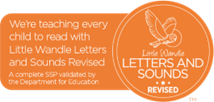Phonics at Worthington
 Phonics Statement 2024/25
Phonics Statement 2024/25
Intent
At Worthington Primary School, we are passionate about ensuring all children become confident and enthusiastic readers and writers. We believe that phonics provides the foundations for learning, making the transition to fluent reading and writing easier. To ensure our children develop strong phonics awareness and master effective blending and decoding skills, we have chosen to use the synthetic phonics program 'Little Wandle Letters and Sounds Revised.' This program ensures that children build on their growing knowledge of the alphabetic code, mastering phonics to read and spell as they progress through school.
We passionately believe that teaching children to read and write independently is one of the primary purposes of a primary school. It enables them to access a broad and exciting curriculum and ensures they flourish as learners throughout their time at our school. These fundamental skills not only unlock the doors to the rest of the curriculum but also have a profound impact on children's self-esteem and future life opportunities.
Our chosen program is validated by the Department for Education (DfE) and follows evidence-based structures to ensure that all children succeed, regardless of their backgrounds or abilities. The program is carefully planned to offer clear progression, building upon learning in a sequential and structured manner, providing repeated practice (see Appendix 1 for progression). The ultimate goal of teaching phonics is to enable children to read fluently, recognising most words instantly and using phonics to decode any unknown words. This means that phonics knowledge needs to be embedded in long-term memory so that its application becomes automatic. Repeated, spaced practice is by far the most effective way to transfer knowledge from short-term to long-term memory. Effective phonics teaching offers repeated practice at the point of learning and revisits the same elements at intervals over an extended period.
In addition, the pace of Little Wandle allows for full coverage of all aspects of the progression in a cumulative way, without introducing too many new elements of learning at any one time. It also allows for significant periods of practice, consolidation, and revision.
At Worthington, by adopting our chosen program, teachers demonstrate fidelity to the scheme, ensuring consistency across all age groups and maintaining high expectations for all children. The program offers ongoing training, allowing all staff to be highly trained and share effective practices with each other and with other schools.
Within the program 'Little Wandle Letters and Sounds Revised,' children can read fully-decodable books that have been carefully selected to:
- Be exactly matched to the phonics progression of the program used
- Present only words made up of grapheme-phoneme correspondences (GPCs) learned to that point
- Include tricky words only as they are introduced in the program
- Be used exclusively when children are practicing reading and not mixed with books that are not fully decodable at the child's level
Alongside fully decodable books, at Worthington, we foster a love of reading from the time a child enters our nursery until they leave Worthington. We believe that learning to read and fostering a love of reading is the greatest gift we can give our children (see the English policy for more details).
Implementation
Little Wandle Foundations
The teaching of phonics begins in nursery, where our staff have fully adopted the 'Little Wandle Foundations' program. Little Wandle Foundations is a comprehensive pre-phonics program designed to help build strong foundations for reading in Nursery. We provide a balance of child-led and adult-led experiences for all children that meet the curriculum expectations for 'Communication and Language' and 'Literacy.' It supports our children to:
- Develop their phonological awareness, including an understanding of rhyme, alliteration, syllables, initial and voice sounds, and oral blending.
- Love stories and rhymes, and learn by heart a bank of familiar favourites.
- Increase their vocabulary and confidence to talk.
- Improve their listening and ability to take part in back-and-forth conversations.
The program is broken down into three areas: Foundations for a Love of Reading, Foundations for Phonics, and Foundations for Language.
We believe that the priority in Nursery should be building the foundations for phonics for all children. Research tells us that disadvantaged children start Nursery behind their more fortunate peers. By leaving formal phonics teaching to Reception, Foundations allows you to devote more time to working with children who need extra help to develop the skills and behaviours that underpin successful reading.
Main Phonics Programme
Discrete daily phonics lessons in Reception and Year 1
It is essential that the teaching of phonics is conducted as a whole-class, discrete phonics session every day. In Reception, we progress from 10-minute sessions, with additional daily oral blending games, to longer sessions as quickly as possible (up to 30 minutes). Each session includes time to revisit and review previously taught graphemes, decodable words, as well as tricky words. This is followed by new learning, which involves graphemes and words containing the newly introduced grapheme, and then the application of both new words and previously taught words within a sentence. Finally, the children are encouraged to understand the two-way process of reading and spelling. Therefore, within the session, the children begin to spell words with the new grapheme taught that day. Every Friday, we review the week's teaching to help children become fluent readers. Children make a strong start in Reception, with teaching beginning in Week 2 of the Autumn term. We follow the Little Wandle Letters and Sounds Revised high expectations of progress.
To ensure consistency across the teaching of phonics we have ensured:
- Every teacher in our school has been trained to teach reading, so we have the same expectations of progress.
- We all use the same language, routines and resources to teach children to read so that we lower children’s cognitive load.
- Weekly content grids map each element of new learning to each day, week and term for the duration of the programme.
- Lesson templates, Prompt cards and ‘How to’ videos ensure teachers all have a consistent approach and structure for each lesson.
- The Reading Leader and SLT use the Audit and Prompt cards to regularly monitor and observe teaching;
It is essential that any child in danger of falling behind is identified early. Therefore, each teacher is highly skilled in assessment for learning allowing repeated practice throughout the day.
Daily Keep Up
Daily keep-up is planned using the summative assessments undertaken every half term. The results of the assessments are analysed and staff discuss the needs of the children with our highly trained staff who carry out the keep-up sessions. The keep-up sessions are carefully planned using the resources from the Little Wandle website. Keep-up lessons match the structure of class teaching, and use the same procedures, resources and mantras, but in smaller steps with more repetition, so that every child secures their learning.
Teaching Reading: Reading practice sessions three times a week
Our Reading Practice Sessions are a crucial part of our phonics program and occur three times a week, every week. Each session serves a specific purpose: decoding, prosody, or comprehension. A highly trained staff member conducts each session with a small group of children. The books are carefully matched to the children's phonics development, using the matching grid.
Reading prompt cards are utilised to ensure consistency across each session, regardless of the leader. Each session follows a similar format, allowing time to revisit the graphemes and words the children will encounter in the book. Each child reads their own copy, with the adult tapping into listen to each individual child. The first session focuses on developing an understanding of any new vocabulary, the second session model’s expression and fluency, and in the comprehension session, the children's understanding is assessed. Comprehension sessions encompass different reading domains:
- Draw on knowledge of vocabulary to understand texts (Vocabulary)
- Identify/explain key aspects of fiction and non-fiction texts, such as characters, events, titles and information
- Identify and explain the sequence of events in texts
- Make inferences from the text (using reasoning skills to interpret beyond the literal).
- Predict what might happen on the basis of what has been read so far
- Deduction – coming to a logical conclusion from the information/evidence available (inference)
- Skimming and Scanning
Engaging Parents/Carers
At Worthington we understand the importance of engaging parents/carers in the development of their child’s reading. We understand and embrace the need to develop relationships with our children’s parent/carers from the moment they enter our school nursery. We develop many strategies to support and inform our parent/carers about how we teach reading. See the Phonics and Early Reading policy for additional information.
Teaching Phonics and Reading in Year 2
The needs of each cohort will change. What to teach and when will be discussed with the Year 2 teachers, English and Reading lead. If phonics teaching is still needed then children will continue to follow the scheme as a whole-class or in groups. Once the programme is completed, Year 2 will then move to the Little Wandle spelling programme:
- Phase 5 Review (5 weeks)
- Bridge to Spelling (5 weeks)
- Spelling (20 weeks)
Regular assessments and keep-up will continue as described in this policy.
Practice Reading Sessions three times a week will continue until the children exit the Little Wandle programme. To exit the programme children, need to complete the fluency assessments.
Phonics and SEND
At Worthington, we believe every child can succeed. Within our teaching, we have high expectations for all children. Where possible we will teach children within the whole-class however, at times we will need to adapt our teaching to meet the needs of each individual child. This will be planned and delivered after careful consideration and discussion with all relevant parties. (class teacher, SEND lead, reading lead and parents). We have accessed the training and resources offered by Little Wandle SEND programme.
Impact
The impact of using the Little Wandle Programme as the basis of the phonics teaching within EYFS and KS1 at Worthington will be for children to develop their phonics skills and knowledge through a systematic, synthetic approach, while covering the statutory requirements outlined in the 2014 National Curriculum. The programme will prepare children for the statutory year 1 phonics screening check and complements the DfE’s Letters and Sounds document. The programme gives a consistent approach to phonics, which is clear to teaching staff and learners. Parental engagement will be enhanced and improved through the use of the parent guidance sheets.
Regular assessments track the children’s phonic development every half term ensuring any child in danger of falling behind is identified quickly and support put in place to ensure children keep-up not catch up. The reading lead monitors these assessments and supports staff with the early identification and next steps. See the Phonics and Early Reading policy for additional information on the specific assessment procedures adopted through Little Wandle.
